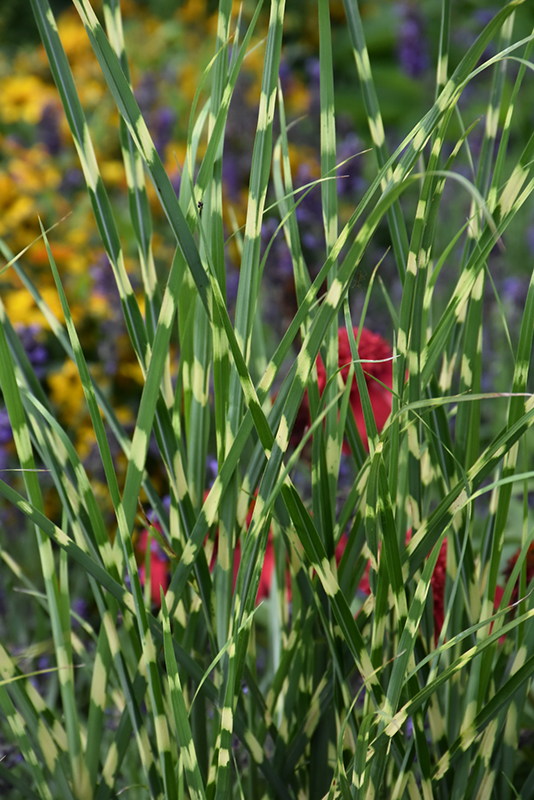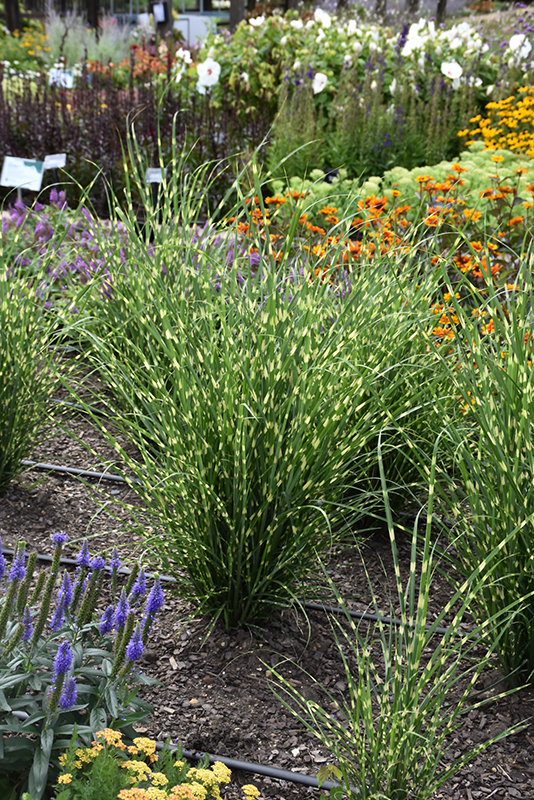NETPS
High Frequency Maiden Grass
Miscanthus sinensis 'NCMS3'

High Frequency Maiden Grass foliage
High Frequency Maiden Grass foliage
(Photo courtesy of NetPS Plant Finder)
Height: 8 feet
Spacing: 4 feet
Sunlight:
![]()
![]()
Hardiness Zone: 4
Other Names: Japanese Silver Grass
Brand: Darwin Perennials
Description:
This variety has tall banded and variegated green foliage, and an upright columnar habit that is quite symmetrical; broad plumes rise above in fall and produce silvery-white seeds; perfect as a border backdrop, hedge, or screen; great winter interest
Ornamental Features
High Frequency Maiden Grass features bold plumes of coppery-bronze flowers rising above the foliage in late summer. Its attractive grassy leaves are green in color with prominent gold stripes. The foliage often turns tan in fall. The white seed heads are carried on showy plumes with silver overtones, which are displayed in abundance from early fall to late winter.
Landscape Attributes
High Frequency Maiden Grass is an herbaceous perennial with an upright spreading habit of growth. Its medium texture blends into the garden, but can always be balanced by a couple of finer or coarser plants for an effective composition.
This plant will require occasional maintenance and upkeep, and is best cleaned up in early spring before it resumes active growth for the season. It has no significant negative characteristics.
High Frequency Maiden Grass is recommended for the following landscape applications;
- Vertical Accent
- Mass Planting
- Hedges/Screening
- General Garden Use
- Groundcover
- Container Planting
Planting & Growing
High Frequency Maiden Grass will grow to be about 7 feet tall at maturity, with a spread of 3 feet. When grown in masses or used as a bedding plant, individual plants should be spaced approximately 4 feet apart. It tends to be leggy, with a typical clearance of 1 foot from the ground, and should be underplanted with lower-growing perennials. It grows at a medium rate, and under ideal conditions can be expected to live for approximately 20 years. As an herbaceous perennial, this plant will usually die back to the crown each winter, and will regrow from the base each spring. Be careful not to disturb the crown in late winter when it may not be readily seen!
This plant does best in full sun to partial shade. It prefers to grow in average to moist conditions, and shouldn't be allowed to dry out. This plant should not require much in the way of fertilizing once established, although it may appreciate a shot of general-purpose fertilizer from time to time early in the growing season. It is not particular as to soil type or pH. It is highly tolerant of urban pollution and will even thrive in inner city environments. This is a selected variety of a species not originally from North America. It can be propagated by division; however, as a cultivated variety, be aware that it may be subject to certain restrictions or prohibitions on propagation.
High Frequency Maiden Grass is a fine choice for the garden, but it is also a good selection for planting in outdoor pots and containers. With its upright habit of growth, it is best suited for use as a 'thriller' in the 'spiller-thriller-filler' container combination; plant it near the center of the pot, surrounded by smaller plants and those that spill over the edges. It is even sizeable enough that it can be grown alone in a suitable container. Note that when growing plants in outdoor containers and baskets, they may require more frequent waterings than they would in the yard or garden.
A NetPS Plant Finder tool
